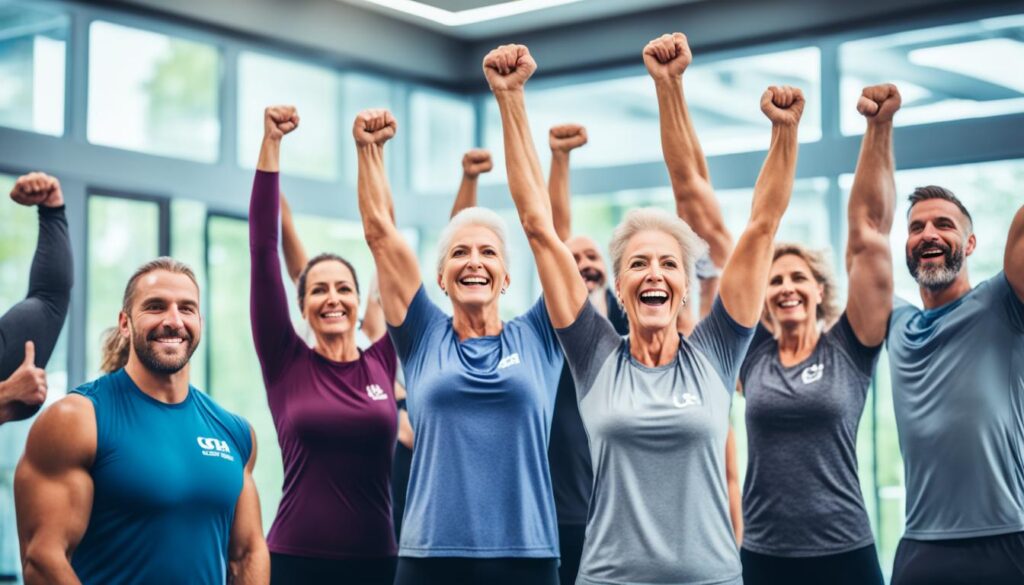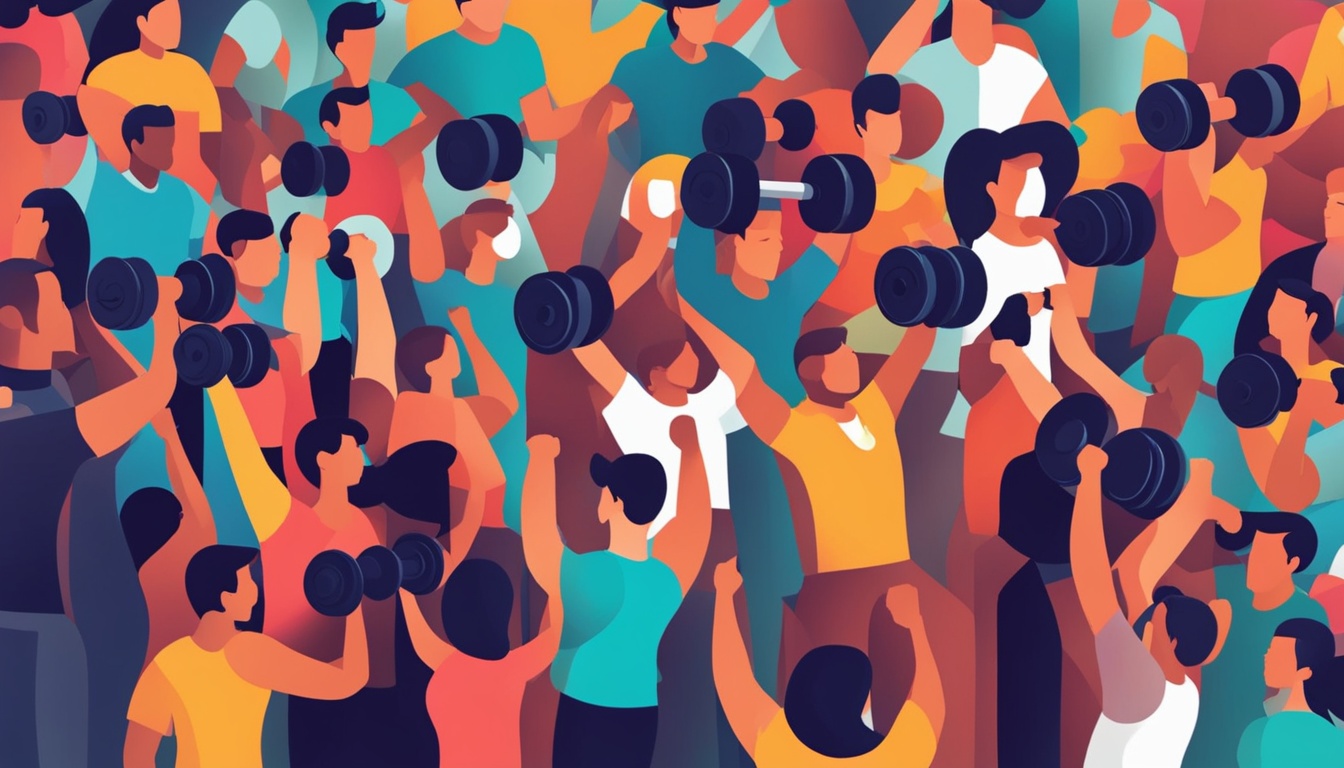Did you know that AYSO, a nonprofit 501(c)(3) group, has 1.6 million members? They focus on mental health and wellness since 20191. The need for mental health support has grown, especially during the COVID-19 pandemic. Now, it’s tough to get help because there are too many people needing it.
Fitness groups are now offering important emotional wellness help. They provide live and online sessions that fit your schedule. This is great for those needing mental health support.
There are new places that mix physical fitness with mental health support. These are called mental health gyms. They aim for your overall well-being.
These communities have group and one-on-one classes. This makes it easy to get mental health support. Join fitness groups that care about your emotional wellness. Check out online health resources to improve your well-being.
The Importance of Mental Health in Fitness
There’s a strong link between your mental and physical health. Regular exercise can boost your mental health, backed by many studies. A study found that staying active lowers the risk of feeling depressed, making it key for a full fitness plan2.
Connection Between Physical and Mental Wellness
Physical and mental health work together. Studies show that both aerobic and resistance training help fight depression2. Exercise also makes your brain work better, linking physical and mental health2. It makes you feel happier and lowers stress in active people, showing how fitness helps overall well-being3.
Benefits of Combining Mental and Physical Exercises
Mixing mental and physical workouts boosts your health in many ways. Yoga helps people with schizophrenia, for example4. Regular walking has made people feel better mentally and emotionally, cutting down on anxiety4. Exercise also protects against losing your mental sharpness as you get older, keeping your mind clear and emotions stable3.
Adding mental exercises like meditation to workouts can increase the benefits. Meditation helps people with schizophrenia feel better4. Aerobic exercises help those with depression too, showing big mental health gains2. This full approach looks after your body and mind, making life better overall4.
How Fitness Communities Foster Emotional Well-being
Fitness communities are key in boosting emotional well-being. They offer more than just physical health benefits. They focus on mental health, making exercise a full wellness solution.
Sense of Belonging and Support
Being part of a fitness group creates a strong sense of belonging. This is vital for feeling good emotionally. People make lasting friendships and support networks5. This support helps fight off loneliness, making life happier and more energetic6.
Regularly taking part in activities improves how we talk to others and work together. This shows how working together towards health goals is important7.
Peer Motivation and Accountability
Having others to motivate us is powerful in fitness groups. It keeps people sticking to their exercise plans7. Working out with others helps beat gym anxiety by making us feel good, boosting our mood and making us more resilient7.
Group classes also help us feel more confident. This confidence helps us tackle challenges in workouts and everyday life6.

Access to Expert Guidance
Fitness groups often have experts who help with both fitness and mental health. They know how to meet our emotional and physical needs with activities like yoga or tai chi5. This makes sure everyone gets the right kind of support.
Adding mindfulness and meditation to these groups can really help with depression and anxiety. It makes us feel clearer and more well-rounded5.
Success Stories: Real-Life Experiences
Discover how fitness communities change lives through amazing success stories. These stories show the big impact fitness has on mental health. They tell us how these communities help people on their mental health journey.
Steven Yates’s story is truly inspiring. He weighed 321 pounds on his 60th birthday but lost 80 pounds. He credits his fitness community for the support and encouragement8. John Obrien also made a big change, losing 27 pounds in two months. He went from a size 40 to a size 34, improving his health both physically and mentally8.

Tami Flaherty’s story is also a beacon of hope. She gained 45 pounds but lost 40 pounds by January 2022, thanks to her fitness community8. Kevin Vig lost 65 pounds over three years with the help of a supportive community8. Brian Somerville started his journey in 2012 and hasn’t had a soda since, showing his dedication to health8.
These individuals tried different activities like running, longboarding, and rock climbing. These activities changed their looks and helped their mental health9. Their stories show how fitness improved their mood, reduced anxiety, and helped with depression9.
The fitness community is a place of support and encouragement. It helps with emotional release, boosts self-esteem, and reduces stress9. Real-life examples highlight how exercise is key in managing mental health and taking control of one’s mental state9. Activities like CrossFit and yoga gave them the support, motivation, and sense of belonging they needed9.
These stories are a testament to the mental health journey of those in fitness communities. They show how physical activities and community support can improve mental well-being. Let their stories inspire you to do the same.
How to Choose the Right Fitness Community for Your Needs
Finding the right fitness community can greatly improve your mental health. It’s important to know what you want for your mental health and how it connects to fitness. Look at what different groups offer to make a good choice.
Identifying Your Mental Health Goals
Start by setting clear mental health goals. These could be managing stress, improving emotional strength, or just feeling better overall. For example, Coa has classes for stress, leadership, and setting boundaries, starting at $4910. Having clear goals will help you pick the best community for you.
Exploring Different Community Offerings
After setting your goals, check out what fitness communities offer. Many include mental health support in their programs. Peloton Digital offers a 30-day free trial for $12.99 a month11. Obé Fitness has classes from 5 to 60 minutes, with 20 live classes a day for $19 a month or $199 a year11. These programs mix workouts with mental health support, showing the community benefits.
Trying Out Classes and Workshops
Try classes and workshops to see what fits you best. Most communities offer trial periods. The Sculpt Society has a $19.99 a month subscription with a 7-day free trial, focusing on fun and motivating workouts11. Trying it out is key; it lets you meet instructors, feel the community vibe, and see if it matches your goals.


